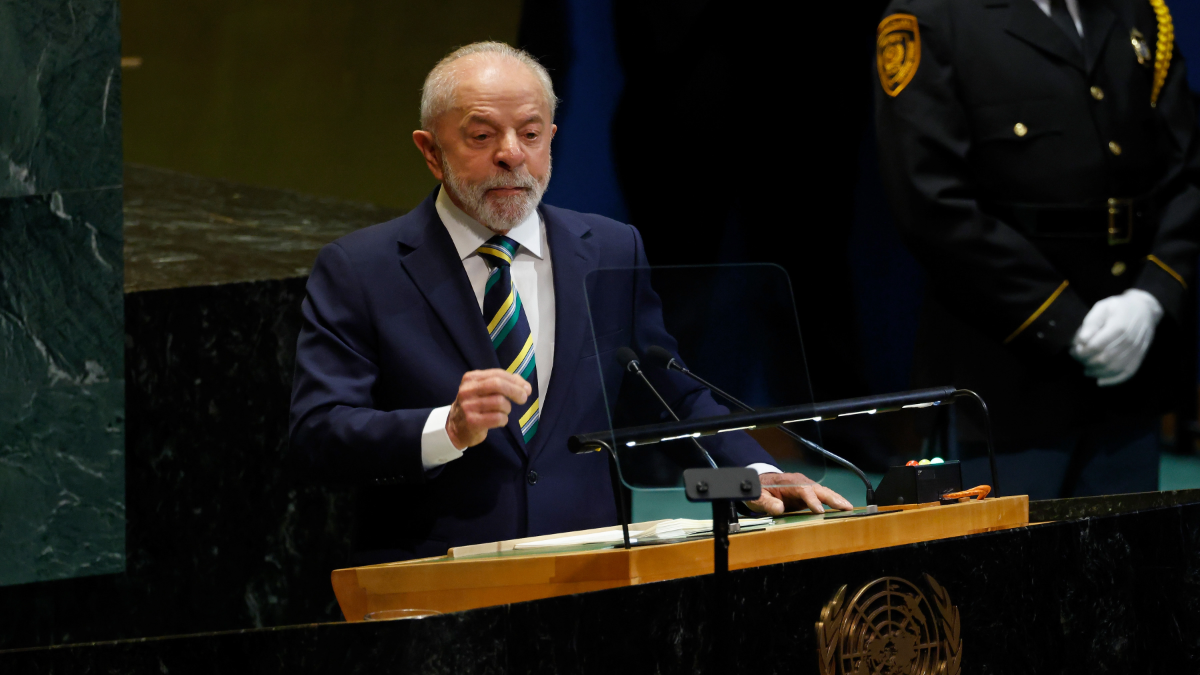At UNGA, Lula Defends Democracy and Brazil’s Efforts to Regulate Tech, but Slips on Data Centers
Laís Martins / Sep 25, 2025Laís Martins is a fellow at Tech Policy Press.

NEW YORK, NEW YORK - SEPTEMBER 23: President of Brazil Luiz Inacio Lula da Silva speaks during the 80th session of the UN’s General Assembly (UNGA) at the United Nations headquarters. (Photo by Taylor Hill/Getty Images)
Brazilian President Luiz Inácio Lula Da Silva delivered a historic speech at the United Nations’ 80th General Assembly on Tuesday, defending democracy in the wake of Brazil’s conviction of former president Jair Bolsonaro and highlighting the country’s efforts to sovereignly regulate technology platforms amid increasing pressure from United States authorities. But although Lula spoke loudly about sovereignty, Brazil’s proposed plan for developing AI infrastructure points in another direction.
In what the New York Times hailed as a “scathing” speech and the Guardian called “an impassioned defence of his country’s democracy,” Lula said Brazil’s trial and recent conviction of Bolsonaro and his allies for plotting and attempting a coup d’état sends “a message to all aspiring autocrats” that democracy and sovereignty are non-negotiable.
Lula’s speech also defended governments’ autonomy to regulate technology to protect those most vulnerable. “Regulating does not mean restricting freedom of expression. It’s about ensuring that what is already illegal in the real world is treated that way in the virtual environment.”
Last week, the Executive branch held an event in Brasília to promote what has been called “the digital agenda.” Last month, Brazil’s Congress passed a landmark law that updates Brazil’s 1990 Statute of the Child and Adolescent to expand its mandates to the digital environment, forcing companies to provide the public with the highest levels of privacy and safety by default. The law was debated by politicians for more than two years, but gained a new sense of urgency after a video-investigation published by an influential YouTuber about “adultization” amassed over 50 million views and generated widespread outrage over platforms’ lack of action.
In addition to sanctioning the child online safety law, the government announced it was submitting to Congress two new proposals: one focused on competition and economic regulation of digital markets, and a long-awaited provisional measure conceding tax incentives for data center development in Brazil.
In a demonstration of how central they are to the government, both proposals were mentioned by Lula in his UNGA speech. Instead of citing tax breaks, Lula chose to highlight, instead, that the proposal encourages “the installation of sustainable data centers.”
But, according to experts, despite the bold talk about sovereignty and the autonomy to regulate technology, Brazil’s data center plan slips by granting tax incentives, providing natural resources without ensuring Brazil advances in becoming less tech-dependent in regards to infrastructure.
In exchange for tax breaks that reduce the cost of implementing and operating data centers in Brazil, developers are required to allocate 10% of each data center’s capacity to the domestic market, as well as investing 2% of the capital spent on equipment in projects that support the “industrial and technological development of the digital economy productive chain.”
The provisional measure also establishes sustainability criteria that must be met by developers in order to access the program, such as being fully supplied by renewable energy — with Brazil’s clean energy matrix as the biggest advantage in relation to other countries — and operating under strict water and power efficiency thresholds.
But, for researchers and civil society groups following data center expansion in Brazil, the benefits are still meager in comparison to what Brazil is giving up. The government has estimated the tax breaks correspond to a loss of R$ 7.5 billion in federal revenue.
One of the arguments used by the government to defend the data center policy is that over 60% of Brazilian data is processed outside of Brazil because the costs of hosting and processing data internally are not competitive. The policy aims to change that to encourage data to be processed in Brazil.
In August, Finance Minister Fernando Haddad, in charge of the department leading the data center policy, said Brazil’s “data sovereignty” is a problem to be dealt with immediately.
But the companies positioned to take advantage of the policy requirements are all foreign, which means that the data would still be processed by Big Tech despite being in Brazilian territory — which does not help Brazil become less dependent on these services.
“There’s a confusion that is very explored by big techs that is the transformation of the idea of sovereignty into data localization, that it would suffice to localize the data in Brazil to have sovereignty. And what digital technologies have taught us is that they can be operated remotely, with the provision of cloud services”, said Sérgio Amadeu, an associate professor at the Federal University of ABC (UFABC), in São Paulo.
This still makes Brazil’s data vulnerable to foreign interference and political pressure. Amadeu mentions, for example, the Cloud Act, a US federal law passed in 2018, that mandates US-based technology companies to follow court orders to provide data stored on its servers regardless of whether it is inside US territory or abroad.
“The measure reveals a serious inconsistency on the part of the federal government. In recent months, the Executive Branch has raised the banner of national sovereignty as a strategic principle. But, at the same time, it is willing to hand over our natural resources to large data center and Big Tech corporations,” wrote the Institute for Consumer Defense (Idec), the Recife Law and Technology Research Institute (IP.rec) and the Laboratory of Public Policy and Internet (Lapin), three civil society organizations, in a statement following the presentation of the policy.
It is unclear what the effect has been, but due to lobbying by US tech firms, Brazil's data center incentives are also apparently on the negotiation table with the US in relation to the tariffs imposed by Trump against Brazil in late July.
“These companies, in Brazil, have already demonstrated themselves to be vectors of antidemocratic practices and concentrate economic and political power on a global scale,” wrote the civil society organizations.
The policy has also received criticism for not putting the protection of the environment and marginalized groups, including Brazil's indigenous people, as top priorities. In the Northeastern state of Ceará, where TikTok is set to install a $10 billion data center, an indigenous group is going to court to push back against its implementation, claiming they were not consulted about the project.
The day before the UNGA, Lula, together with the current and former governors of Ceará, met with TikTok CEO Shou Zi Chew. According to BBC Brasil, citing unnamed sources who took part in the meeting, the project in Ceará was discussed.
“The proposal lacks explicit socioenvironmental and climatic safeguards to prevent impacts that have already been identified in international and national experiences. Among them, worsening water stress, rising local energy costs, pollution, territorial conflicts, and the exclusion of local, indigenous, and traditional communities from decision-making processes,” says the statement by Idec, IP.rec and Lapin.
Many specific details of the policy are still pending and will be defined by a following measure, set to be published before the tax benefits come into force in January 2026. Congress members can also submit amendments to the bill, which could result in some changes. But the government has insisted on moving swiftly with the proposals to take advantage of what the technology sector has called a window of opportunity.
With the policy now unveiled, Brazil should see a wave of new data center investments in the country. What remains to be seen is whether the government will be open to input and accommodating to changes that could lead to more solid safeguards to protect the environment and communities around the projects, while also ensuring the country is taking steps to reduce its dependency on Big Tech services.
Authors
